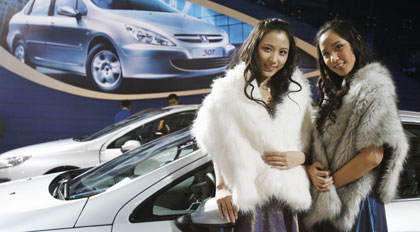Auto market sweet and sour for foreign makers
(AFP)Updated: 2006-12-06 14:23
Urban, wealthy and crazy about cars -- Liu Qiulong is the kind of customer big-league auto makers had in mind when they hailed China's entry into the World Trade Organization five years ago.
A salary of 8,000 yuan (US$1,020) a month, or more than four times the average earnings of his fellow Beijing residents, made it possible for him to realize a boyhood dream -- buying a big car.
"I got a Volkswagen for 250,000 yuan (US$31,900)," he said. "I bought it because I could. I could afford it."
People like Liu make this the perhaps most exciting auto market in the world and China's membership in the WTO, which kicked off on December 11 2001, has only made it even more exciting.
Almost all the world's leading auto makers have come to China, from Japan's Toyota to Germany's BMW, from Peugeot of France to General Motors and Ford of the US.
Yet the market also involves challenges highlighted this year in a heated debate over local content requirements.
Like the sweet-and-sour dish of the local cuisine that many auto executives learned to appreciate when settling down five years ago, the China experience has not been exclusively sugar-coated.
"We knew from the very beginning that to do auto business in China is like running a Marathon, not a 100 meter sprint," said Thomas Yao, a spokesman for Ford.
But it is all worth it or the auto makers would not be here. It is expected that China will see auto sales reach an all-time high of 7 million this year, compared to 2.73 million just five years ago.
"More and more now buy a second car," said Chen Zhiming, a sales consultant at Qinhe Auto, a Beijing-based dealership. "Usually they go for a much better model than the first car."
The trend is clear. China could become the world's top auto market by 2020, with output reaching 15 million units, the Economic Daily said, quoting the Policy Research Office.
Some of this is due to tariff rates on imported autos that have gone down from as high as 100 percent to 25 percent now, and import quotas that have disappeared entirely.
But the vast majority of cars sold in China have rolled off the assembly lines of one of several joint ventures between Chinese and foreign partners.
"China's entry into the WTO has helped create a reliable environment for foreign investors," said Jean-Yves Dossal, general director of Donfeng Peugeot.
He said his company expected its sales of locally produced cars to double to more than 81,000 this year, from zero just a little while back.
"We sold our first car only 28 months ago," he said. "With the market continuing to grow that rapidly, we won't have much to complain about."
What many auto makers do criticize, however, is a minimum local content requirement for cars produced domestically, reinforced by rules charging tariffs if the value of the foreign parts content exceeds the threshold.
Chinese customers are often not too happy, either, as they perceive a slide in quality as a result of the local parts.
This has consequences for companies such as Japan's Nissan, which is shifting from exporting cars to China to manufacturing them locally, in what it calls the most important change in China business strategy in recent years.
"China is one of our major manufacturing bases after the US and Japan, and it will probably have a more important role in the future," said Takeshi Chiba, manager of Nissan's China Operation Support Office.
"But we still import some auto parts from Japan and other Asian countries, so a reduction in tariffs is a good thing for us."
The European Union, the United States and Canada have argued that the auto part rules violate China's accession agreement to the WTO, prompting the WTO to launch an investigation.
"The Chinese government mainly wants to prevent a situation where companies are actually not building cars in China but importing and assembling in China," said Alex Fan, the head of China research at Daiwa Institute of Research.
"This is not what the Chinese government would like to see in the first place when they signed the WTO agreement."
| ||
|
||
|
||
|
|

